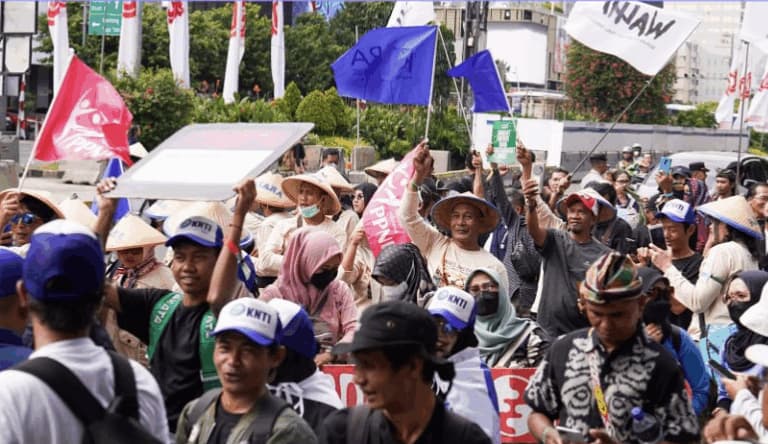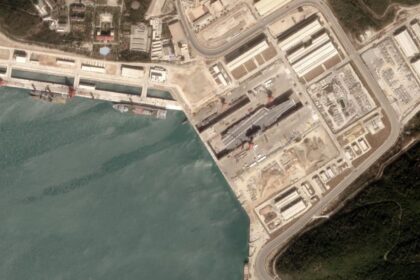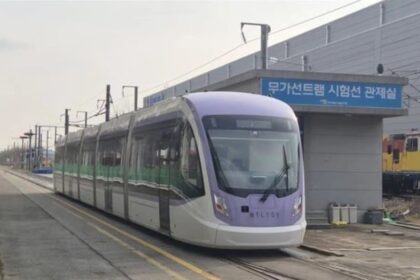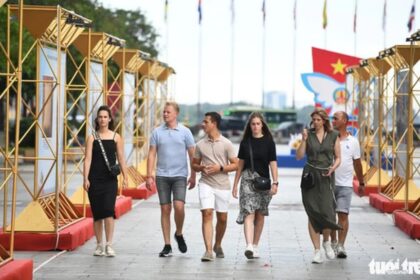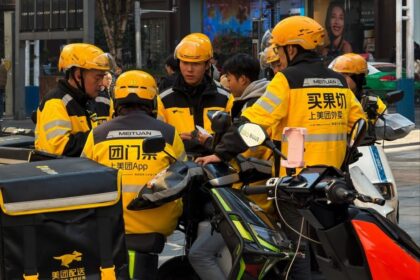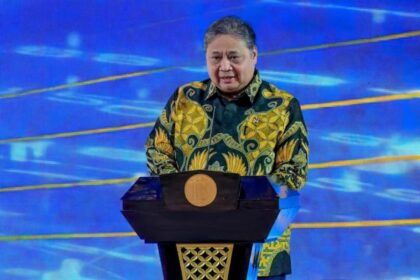A rights based push born from climate hardship
A broad coalition of farmers, fishers, Indigenous communities, workers, the urban poor, youth, the elderly, and people with disabilities is pressing Indonesia to adopt a Climate Justice Bill. Their message is direct. Climate change is already displacing families, shrinking incomes, and eroding safety for those who contributed least to the problem. They want climate justice recognized as a right under the constitution and translated into a clear legal framework that protects the most affected communities, coordinates action across sectors, and holds both government and business to account.
- A rights based push born from climate hardship
- How a hotter and less predictable climate is reshaping daily life
- What the Climate Justice Bill proposes
- Voices from the frontlines
- Indigenous land, energy projects and the nickel rush
- People with disabilities and migrant workers face rising risks
- Inside the legislative fight
- Law and policy context and why justice is missing
- What a fair transition could deliver
- Key Points
The human costs are mounting. Erratic seasons, shifting winds, stronger heat, floods, and coastal erosion have knocked out harvests and fish catches, pushed people into debt, and forced risky migration. In 2022, climate related disasters displaced 32.6 million people globally, according to international displacement monitors, and the number is expected to keep rising by mid century. Indonesia faces heavy impacts. Research cited by legal and civil society groups shows the country recorded 28,471 climate related disasters between 2013 and 2022, affecting 38 million people and displacing 3.5 million. Estimated losses in the 2020 to 2024 period reached hundreds of trillions of rupiah.
The push for a law has coalesced through a national gathering known as the Indonesia Climate Justice Summit in Jakarta and a series of community consultations across many regions. A civil society alliance known as the People’s Alliance for Climate Justice, or ARUKI, compiled a 300 page academic paper to guide legislation and is urging parliament to put a draft in the National Legislation Program as soon as possible. Some lawmakers have signaled support, while others prefer a more technical bill title. Advocates argue that centering justice is the only way to match climate policy with the daily realities of vulnerable groups. If passed, the measure would set a first in Southeast Asia by expressly enshrining climate justice in law.
What climate justice means
Climate justice links climate action to fairness, rights, and real participation. It asks who benefits, who pays, and who decides. It calls for policies that cut emissions and build resilience while protecting livelihoods, culture, and health, especially for people who live on the front line of floods, droughts, fires, sea level rise, and heat. It also demands remedies when harm occurs and recognition that responsibility and capacity differ among groups and across generations.
How a hotter and less predictable climate is reshaping daily life
On islands and along coasts, weather patterns that once guided planting and fishing no longer match the calendar. In West Kalimantan, Dayak communities describe seasons that arrive off schedule. This disrupts planting cycles, reduces yields, and strains food security. For families that rely on community forests and customary land, the loss of predictability can break links to cultural practices that have sustained people and ecosystems.
In Sangihe in North Sulawesi, residents face frequent rough seas and higher tides. Fisherfolk go out less often, returns drop, and costs rise. Households raise floors, shift drying racks, or build improvised barriers, yet these fixes are temporary. Across northern Java, from Demak and Pekalongan to parts of Semarang and Jakarta, coastal communities live with chronic tidal flooding, subsidence, and pollution. Sea walls and reclamation projects provide short term relief for some areas while pushing water and sediment problems onto others. Clean water grows scarce. Over time, the debt of replacement and repair can push families to sell assets or move.
These climate pressures intersect with inequality. Large projects focused on extraction or coastal development can amplify risk when community consent is weak and basic services are neglected. Women carry added burdens in water collection and care work. Young people face shrinking job options near home. Many families are forced into tough choices about migration, which can expose them to exploitation.
What the Climate Justice Bill proposes
Indonesia does not yet have a dedicated climate law. Existing regulations address carbon pricing and project level measures, but they do not provide a single framework that centers people most exposed to climate harm. The proposed Climate Justice Bill seeks to fill that gap. Based on consultations across many regions and with multiple vulnerable groups, the draft prioritizes justice as the core of adaptation and mitigation. It promotes fair distribution of benefits and burdens, meaningful participation, remedies for harm, and protection across generations.
Draft principles and provisions highlighted by civil society include:
- Recognition of vulnerable groups, including Indigenous peoples, fisherfolk, farmers, women, workers, the urban poor, youth, the elderly, and people with disabilities
- Distributive, procedural, corrective, gender, recognitive, inclusive, and intergenerational justice as guiding values
- Clear duties for agencies to coordinate across sectors, from disaster management and social protection to health, labor, education, land, and environment
- Inclusive data systems and adaptive social protection that account for disability, age, gender, and location
- Protection for workers during climate disasters and the energy transition, including safety standards and fair compensation
- Safeguards for farmers and rural communities against land grabbing, and recognition of urban villages and coastal fishing grounds
- Access to information, public participation in planning, and complaint mechanisms with enforceable remedies
Advocates say the bill should also close gaps that allow climate projects to harm communities, for example by requiring meaningful participation from the start, aligning disaster recovery with long term plans, and ensuring that climate finance reaches people on the ground.
Voices from the frontlines
The call for a law is grounded in experience. Former fish farmers describe watching pond salinity and temperatures swing outside normal bounds, then seeing their savings disappear. Some moved abroad to market jobs or domestic work, only to confront abuse. Indigenous farmers talk about planting cycles that no longer match, while disabled residents recount evacuations that fail to account for mobility or sensory needs.
Muninggar, a former fish farmer from northern Java, said she left for the Gulf after erratic weather ruined her ponds and debt piled up. She returned home after a traumatic ordeal abroad. Today she wants a law that helps people rebuild livelihoods without being forced to migrate.
After she described her decision to leave, she summed up the pressure families feel when climate hits and options narrow.
Going to Dubai was an act of desperation.
At the Indonesia Climate Justice Summit in Jakarta, testimony from many regions underscored the same theme. A traditional fisherman spoke about identity, daily survival, and dignity in the face of rough seas and falling catches.
Fisherfolk are not the cause of the climate crisis, we protect the sea. What we demand is justice, not pity. Without us, who will feed this country?
A community representative from Nusa Tenggara Timur described a geothermal project that went ahead without local consent, a situation that she said deepened a sense of exclusion.
Our hearts are broken. The geothermal project was implemented without our consent, and our voices were ignored. When we refused, we were labelled anti development, and some were even criminalised. We are not asking for pity, we are asking to be respected.
These accounts reflect a common thread heard across coastal villages, farming hamlets, and dense urban neighborhoods. Climate change adds pressure to places already living with land tenure disputes, inadequate water and sanitation, and limited access to services. A justice focused law aims to change that balance.
Indigenous land, energy projects and the nickel rush
Indonesia is home to thousands of Indigenous communities, with total population estimates in the tens of millions. Many live near forests and coasts that are highly exposed to the fires, floods, and sea level rise that come with a warming climate. Yet community rights and participation in planning and permitting remain weak in many areas. Conflicting policies and project approvals have displaced families and sparked land disputes. Over the past decade, civil society groups recorded hundreds of agrarian conflicts involving Indigenous peoples that touched millions of hectares of customary land.
Expansion tied to the energy transition has raised new environmental and social risks. Nickel mining and processing in parts of Central Sulawesi, Southeast Sulawesi, and North Maluku has transformed rural landscapes into industrial zones. Reports from the ground cite polluted waterways, degraded fisheries, dust and air pollution, and rising respiratory illness. The drive to supply battery materials has brought jobs and revenues, yet costs are concentrated on communities who depend on land and sea for livelihoods and culture. The link between coal fired power for processing plants and rising emissions shows how a transition that ignores justice can backfire. Studies found that national emissions rose sharply between 2022 and 2023 in part because nickel processing relies on coal power.
Policy is evolving. A recent court ruling broadened space for Indigenous communities to cultivate forest areas without permits, a change welcomed by many. Yet recognition of customary forests still covers a small fraction of the land Indigenous peoples claim, and safeguards remain uneven. A climate justice law could reinforce the principle of free and prior consent, require active participation, and align land, mining, and energy policies with community rights.
People with disabilities and migrant workers face rising risks
People with disabilities face barriers at every stage of disaster and recovery. Evacuation routes, shelters, and relief distribution often lack ramps, accessible information, sign language support, and disability aware staff. Heat waves and smoke can worsen existing health conditions. Families report that data systems do not count disability accurately, which leads to exclusion from assistance. A climate justice law that mandates inclusive design and data, accessible early warning, and tailored social protection would reduce risk and save lives.
Climate stress has also pushed farmers and fishers into migration. This often happens without protection. Workers who leave in a hurry may fall into debt bondage, trafficking, or unsafe jobs abroad. When disasters hit at home, migrants and their families struggle to access benefits or legal aid. The proposed law calls for worker protection during disasters and the transition to cleaner energy, including safety standards, wage protection, and fair processes for complaints.
Inside the legislative fight
ARUKI, formed in 2023 and made up of dozens of civil society groups, gathered testimony across more than a dozen regions to inform a draft. The alliance emphasizes that climate justice is inseparable from social justice and human rights. Their proposal asks parliament to adopt justice oriented principles and ensure the law covers everything from land, water, and health to labor, education, and disaster management.
Parliament has taken early steps, and public debate has opened over the bill’s name and scope. Some legislators proposed a Climate Change Management Bill that focuses on technical aspects. Civil society argues that without explicit justice provisions, key gaps will persist. Several lawmakers have voiced support for a rights centered approach, calling the environment a fundamental right and urging swift deliberation.
One member of the House captured the constitutional angle in public remarks.
A healthy environment is a fundamental right, and the bill must be realized immediately.
Advocates hope to see the draft placed in the National Legislation Program and discussed in the near term. They also want the process to remain open to communities, with hearings and dialogue that include those most affected. Public marches and consultations have delivered a clear call to make climate justice a legal duty, not a slogan.
Law and policy context and why justice is missing
Indonesia has climate strategies that guide emission cuts and adaptation across sectors, including updated national targets and long term planning documents. Yet independent analysis of these documents finds that the justice dimension is underdeveloped. The narrative often centers on totals and technical outcomes while paying less attention to who bears the costs, how communities participate in decisions, and what remedies exist when projects cause harm. Policy on forests and land use illustrates the challenge. Sustainable logging and community forestry programs aim to cut emissions, but when they restrict traditional practices like controlled burning without viable alternatives, they can push people into food insecurity and erode cultural continuity.
The energy transition is another test. An international financing plan to accelerate renewables has helped popularize the idea of a just transition, but attention still tilts toward power sector metrics. Meanwhile, the nickel boom has delivered uneven benefits. Between 2022 and 2023, national greenhouse gas emissions rose by one fifth in part because nickel processing plants run on coal. Local environments and health have absorbed new risks. A justice centered climate law can knit together energy, land, industry, labor, and social protection so that climate action reduces poverty and protects nature at the same time.
International law is also moving. In a recent advisory opinion, the International Court of Justice clarified that states have duties to prevent significant environmental harm, to cooperate, and to regulate businesses for climate harm regardless of borders. The Court affirmed that the right to a clean, healthy, and sustainable environment underpins other human rights, and that intergenerational equity should guide climate obligations. These principles align with the proposed bill’s core values. They also reinforce the case for remedies when harm occurs and for including vulnerable communities as decision makers, not afterthoughts.
What a fair transition could deliver
A Climate Justice Bill cannot end climate impacts on its own. It can set the rules so that government agencies, companies, and communities share responsibility fairly and take action that matches the lived experience of those most exposed. Civil society groups and experts point to practical features that would make a real difference.
- Set a legal right to climate justice, tied to the right to a healthy environment
- Require meaningful public participation at every stage, with special measures so women, youth, Indigenous peoples, workers, the elderly, and people with disabilities can contribute
- Create a single coordination node that brings together land, water, energy, transport, health, education, labor, and social protection
- Protect workers during disasters and sector shifts with safety standards, job training, and fair compensation
- Guarantee accessible early warning, evacuation, shelters, and recovery services for people with disabilities
- Recognize customary land and community rights, and align projects with free and prior consent
- Design climate finance to reach communities directly, with transparent tracking and complaint channels
- Strengthen monitoring and evaluation with indicators that measure equity, participation, and repair of harm
These measures would help Indonesia reduce climate risk, avoid preventable harm, and build trust. They would also support a transition that protects food security, culture, and nature while creating decent work.
Key Points
- Grassroots groups are urging parliament to pass a Climate Justice Bill that centers rights, fairness, and participation
- Families across Indonesia face rising climate losses, with millions affected and hundreds of trillions of rupiah in recent damages
- The draft bill, developed through wide consultations, names vulnerable groups and sets justice principles for policy and practice
- Indigenous communities face land conflicts and pressure from mining and energy projects, while recognition of customary forests remains limited
- People with disabilities encounter barriers in evacuation, relief, and recovery, pointing to the need for inclusive design and data
- Climate stress has pushed workers into risky migration, raising concerns about exploitation and the need for stronger protection
- Some lawmakers back a rights centered law, and civil society wants the draft placed in the National Legislation Program soon
- Analysts find justice gaps in current climate plans, while an International Court of Justice opinion reinforces state duties and the right to a healthy environment
- A strong law could improve coordination, require consent and participation, protect workers, and deliver accessible services during disasters


